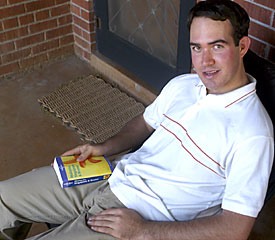 |
|
WILL SEBERGER/Arizona Daily Wildcat
|
Clay Condon, mechanical engineering senior, cancelled plans for an extended stay in Singapore after his study-abroad program ended. Condon cited the recent SARS outbreak in that country as the deciding factor.
|
|
By Shelley Shelton
Arizona Daily Wildcat
Wednesday April 23, 2003
Loss of funding keeps some students away from Asia, others weigh options before leaving
Arizona has reported only one suspected case of SARS, but the potentially fatal virus has already taken its toll on some UA students.
"I was studying in Singapore, but I came back to Tucson Thursday," said Clay Condon, a mechanical engineering and business economics sophomore who had been overseas since January.
"I had planned on traveling in Southeast Asia after the semester was over but came straight back instead because of SARS. I wanted to come home early to prevent any further risk of exposing myself," he said.
More than 3,800 cases of SARS have been reported worldwide, resulting in more than 200 deaths, according to the World Health Organization. Of those, nearly 2,000 cases were in China and more than 1,400 in Hong Kong.
SARS:
Who is it affecting?
Worldwide:
More than 4,000 people infected
239 known deaths
In the U.S.:
231 total known cases
192 suspect cases
39 probable cases
In Arizona:
1 known case
1 suspect case
Source:
World Health Organization
|
The United States has reported 220 suspected cases with no deaths, the Centers for Disease Control and Prevention reported.
University Medical Center doctors recently saw one case they initially suspected was SARS, but it turned out to be something else, said Eskild Petersen, UMC chief of adult infectious diseases. Still, it gave the hospital a good practice run, he said.
"We have instituted very strict measures. We are taking it very seriously," Petersen said.
Jesse Infeld, an economics senior who has been studying at Nanjing University in China since August, said in an e-mail that all he can do right now is take extra hygienic precautions and relax.
"I wash my hands frequently, rest a lot, keep warm, use my own chopsticks and bowls when I go out to eat, and I don't go to crowded areas," Infeld said.
"My friends and family back home are, of course, worried. My parents know, though, that there isn't much they can do to make me come back before I want to, and they trust my judgment and the judgment of my study abroad program," Infeld added.
Some student programs have been put on hold indefinitely because of the disease.
Stephen Sosnicki's plans to teach English in China over the summer abruptly fell apart Monday after the Flinn Foundation, a major sponsor of the trip, backed out.
"They sent an e-mail saying their lawyers had advised them not to fund people going to affected areas," said Sosnicki, a molecular and cellular biology sophomore. "It's really a shame. I had been looking forward to this trip for a long time. The fear of the disease is worse than the disease itself."
Another would-be traveler to China, whose Flinn Foundation money was also canceled, remained optimistic about finding funding elsewhere.
"I'm hoping that money from the National Secondary Education Program will still come through," said Michelle Hertzfeld, an international studies junior. Hertzfeld had expected a decision by Monday, but as of yesterday, she had not received word.
"The World Health Organization says that, in three months, it won't matter where you are," she said. "Since there are no treatments, I might as well be in China."
While the virus that causes SARS has been identified as a member of the coronavirus family, its origin remains unknown, Petersen said. It appears to spread like the common cold, he added.
"It is not one of the viruses that was known to man," Petersen said. "There is, as of yet, no definite test for the disease."
The corona family of viruses affects all kinds of animals, he said. "Corona" refers to the appearance of a crown on the cells under an electron microscope. With the flu season coming to a close, however, it has become easier to differentiate types of symptoms, he added.
"I don't have a crystal ball. But it doesn't look like it will be eradicated, and we'll probably have to learn to live with it," he said. "And I think we can do that."
In the interim, however, students like Hertzfeld are left to weigh their options.
"If you had asked me a month ago, I would have been less nervous," she said. "It's very confusing."
- Ian Musil contributed to this report.

